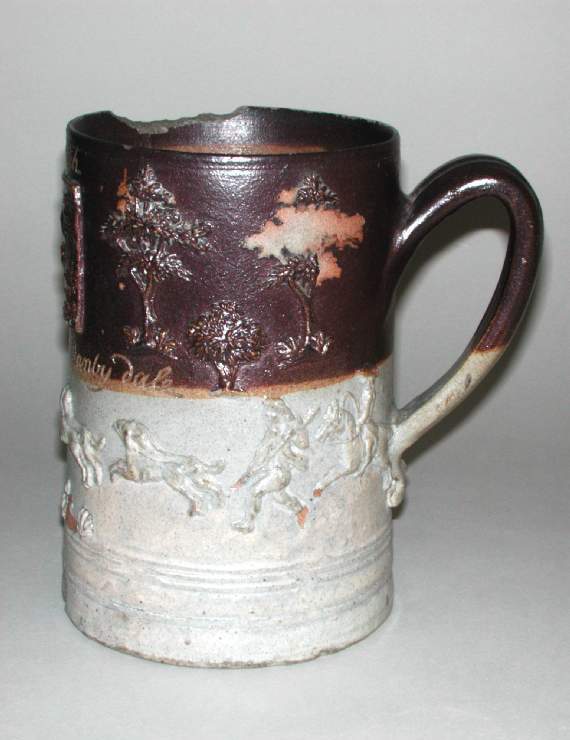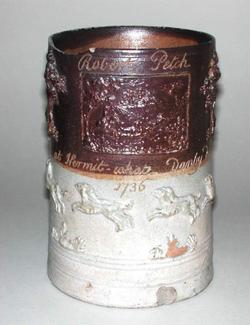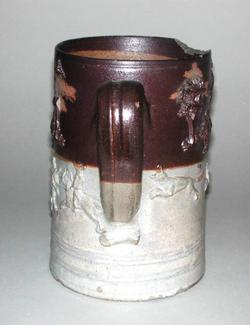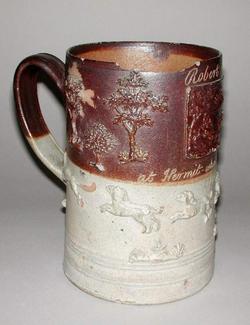Current Location: In storage
Titles
Hunting Mug
Maker(s)
Pottery:
Lambeth High Street Pottery
(Possibly)
Entities
Categories
Description
Salt-glazed stone-ware covered in slips with hunting reliefs and inscriptions.
Buff-coloured stone-ware, covered with brown and grey slips, decorated with sprigged hunting reliefs and salt-glazed. The cylindrical mug has a reeded-loop handle. The top half of the mug is covered in brown slip and the bottom half in grey. On the upper part of the mug, there is a rectangular relief plaque of a mounted huntsman and his dogs pursuing a stag; the relief is flanked on either side by three trees. On the lower part, there is a fox hunting scene, which runs clockwise round the mug and features one mounted huntsman and one on foot, four couple of hounds and the pursued fox. Incised above the stag-hunting plaque is the name ‘Robert Petch’ and below it the words ‘at Hermit-whate Danby Dale’.
Notes
History note: Provenance unknown before bought in Conway in Wales for Mr G.A. Smith of St Ives, Huntingdonshire; Smith sold it for £2.10.0 on 26 September 1905 to Dr J.W.L. Glaisher, FRS, Trinity College, Cambridge
Legal notes
Dr J.W.L. Glaisher Bequest
Measurements and weight
Height: 20.9 cm
Width: 20 cm
Acquisition and important dates
Method of acquisition: Bequeathed
(1928-12-07)
by
Glaisher, J. W. L., Dr
Dating
18th Century, second quarter
George II
Production date:
AD 1736
Note
Brown stoneware hunting mugs were produced by a number of English potters in the 18th-century. They were the products of a time in which hunting and drinking were, as contemporary hunting ballads attest, strongly connected and viewed as great pleasures in life. Hare-hunting was the most common form of hunting at this time but fox-hunting, which is depicted on this mug, was becoming increasingly fashionable. It has been suggested that woodcut illustrations for popular hunting ballads inspired the decoration of the mugs.
Surviving examples of hunting mugs have been divided into four types, labelled A to D. This mug belongs to the ‘Type C’ group with a clockwise hunt. Hunting mugs are thought to have been made by potteries in London and in Bristol. Traditionally, ‘Type C’ mugs were attributed to Bristol but the names and places inscribed on this mug suggest that a London origin is more probable. ‘Danby Dale’ is in North Yorkshire and ‘Hermit whate’ probably refers to Armattwhate, a village in the region. Robert Petch, the man named on the mug, was a landowner in the area. Petch's family papers demonstrate he also owned land in Henley-on-Thames. Long-distance communication was difficult in the 18th-century and therefore it is more likely Petch commissioned the mug from a London pottery than from a Bristol one as London was closer to Henley. W. W. Hamilton Foyn has argued that ‘Type C’ mugs were the product of the Lambeth High Street pottery in Vauxhall.
Components of the work
Base
Diameter 14.6 cm
Body
Reliefs
Materials used in production
brown on top half, grey on bottom half
Slip
buff
Stoneware
Salt-glaze
Techniques used in production
Slip-coating
Salt-glazing
Inscription or legends present
- Text: Robert Petch
- Location: Above applied stag-hunting relief plaque
- Method of creation: Incised
- Type: Inscription
- Text: at Hermit-whate Danby dale/1736
- Location: Below applied stag-hunting relief plaque
- Method of creation: Incised
- Type: Inscription
Inscription present: stick-on rectangular white paper collector’s label with blueline border and trefoils in top corners
- Text: name and/date 1736./Bought at St Ives/(Hunts) Sept 26, 1905./Came from Conway.
- Location: On base
- Method of creation: Handwritten in black ink
- Type: Label
Inscription present: circular, stick-on white paper label
- Text: "83"
- Location: On base
- Method of creation: Handwritten in black ink
- Type: Label
References and bibliographic entries
Related exhibitions
Identification numbers
Accession number: C.1200-1928
Primary reference Number: 71543
Old catalogue number: 2324
Stable URI
Audit data
Created: Saturday 6 August 2011
Updated: Tuesday 30 April 2024
Last processed: Tuesday 15 July 2025
Associated departments & institutions
Owner or interested party:
The Fitzwilliam Museum
Associated department:
Applied Arts









